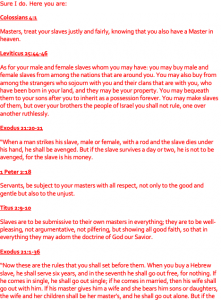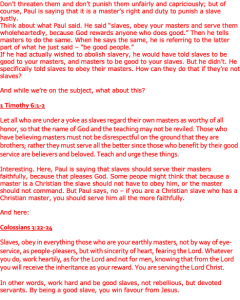Paulomycin
Well-Known Member
- Feb 22, 2021
- 1,482
- 376
- 53
- Country
- United States
- Gender
- Male
- Faith
- Reformed
Again: how much Paul loved Onesimus is quite beside the point.
1. You have no reason to blithely dismiss it.
2. The love relates directly to the narrative in that (a.) God is not a respecter of persons, and (b.) all converts are equal family members subordinate only to God; the earthly class conflict no longer matters.
The point is, he sent the runaway slave back to his master.
No, he sent a brother in Christ back to a brother, "no longer a slave." - Philemon 1:16
If Paul had actually been opposed to slavery, he wouldn't have done that. He would have recognised that Philemon had no claim over Onesimus; that by holding him as a slave, he had done him wrong, and Onesimus was under no obligation to him. But no: Paul loved Onesimus, but recognised that a slave must be returned to his master. Because of his love, he wanted Onesimus to be freed - not because he was opposed to slavery, but out of affection for this particular slave - but he recognised that it was Philemon's place, as the master, to make that decision.
You're redundantly repeating yourself ad nauseum while literally cherry-picking key verses relevant to the debate.
You're right. Paul didn't violate any law. He sent a runaway slave back to his master. That was the wrong thing to do; Paul should have simply helped to free the runaway slave. But Paul was pro-slavery, so instead he entreated the slave's master to free him, out of the love he bore them both.
Now you're contorting yourself to satisfy your own confirmation bias. If he sent a runaway slave back to his master, then he would be violating Deuteronomy 23:15-16. But he reminded them both of their actual class status as equals. Again, it clearly says, "no longer a slave." - Philemon 1:16 On his apostolic authority granted to him by the Lord Jesus Christ, Paul abolished the slave relationship between these two individuals. "Therefore if the Son makes you free, you shall be free indeed."- John 8:36
But the HCSB translation's heading is a later inerpolation.
Where are shrine prostitutes in the army camp (verse 17)? All chapter and verse divisions are later interpolations. You're inferring that "enemy" POWs are automatically processed as "slaves" in your head. Moreover, you've teleported from a camp on the battlefield to "whatever town they choose" among you. Verses 15 and 16 do not apply exclusively to the battlefield. "Towns" were not established until after the occupation of Israel, and refer to local towns among the 12 tribes. It's simply what the Bible says. All you have to do is read it, in the context, something you really should try to familiarise yourself with.
Because if you're attacking a people it benefits you if their slaves run away from them. Why would you aid the enemy by returning their resources to them?
Pagan slave laws don't apply to Hebrews. And pagan slaves are not enemy soldiers. The class distinctions are obvious here. Again, I clearly stated, "Why would enemy slaves get an exemption exclusive only to foreigners, but not a native-born Hebrew?" Referring to the enemy slaves over native-born Hebrew slaves. Answer: They don't, because there's one law.
Again, those verses don't mean what you think they mean. Read them in context.
Eisegetical interpretation and cherry-picking is outright violation of the context. Your "context" is imaginary and depends on deliberate omission of keywords in-order to sustain your bias.
I have the greatest respect for Martin Luther King. If he was able to make people behave better by making them think that the Bible was against slavery, then good for him. But whether he actually believed it or not, he was wrong.
We've already established you threw MLK under the bus. No need to repeat yourself.
Where does he preach that?
If he's pro-slavery, then it's certain he's also pro-3/5ths rule.
Nonsense. Jesus and the aspostles were clear and direct on what was sinful. There are many examples of them being outspoken against sin, regardless of the consequences. If they had thought that slavery was sinful, you can be sure they would have said so. But they didn't. Instead, they praised it, and exhorted slaves to be obedient.
- You have zero citations of anyone "praising" human-on-human slavery in the Biblical text. It's nothing more than your eisegetical bias.
- Jesus subverts slavery in Matthew 20:25-27.
But Jesus called them to Himself and said, “You know that the rulers of the Gentiles lord it over them, and those who are great exercise authority over them. 26 Yet it shall not be so among you; but whoever desires to become great among you, let him be your servant. 27 And whoever desires to be first among you, let him be your slave—
Again, mutual voluntary submission among each other equally.
The part where you think it is a commandment to end slavery, rather than a commandment to be just and kindly masters to slaves.
Believers are commanded to give up that dynamic among themselves; not overthrow Roman slavery. Believers are commanded to give up concubines and temple prostitutes; not overthrow Roman temples. Believers are commanded to adhere to just weights and measures in the marketplace; not impose a new standard for Rome. Believers are commanded to love one another, and not force Rome to love one another.
Read it again, and think about it a little more.
I don't have to "think about it" according to your eisegetical confirmation bias.
You think Paul is saying that masters should be obedient to their slaves? What nonsense. He's saying that they should treat them justly and fairly, as slaves.
You're reading into it. "Do the same to them also," does not mean "Do the same to them, but by that I mean treat them like slaves and not literal brothers." This isn't "code" for oppression.
That they should take care of them, and reward them if they do well, and only punish them if they fail in their duties. Not threatening and punishing them capriciously or unfairly or vindictively, but only if they do not perform their duties.
There is no threat of punishment. Thus, "slavery in name only."
And now, think about one more thing: how could Paul be saying that he wants to end slavery if he tells slaves to be obedient to their masters? If slavery is ended, how are they going to do that?
You're equivocating institutional "slavery" with individual slavery. Paul's telling everyone to be obedient to one another as to Christ. Thus, it's equal. Hey, actually read the book, and see what it says. Take it on its own terms. Don't cherry-pick the words you want to ignore. And when it says, "no longer as a slave," why not just accept that this is exactly what it meant.
Upvote
0



